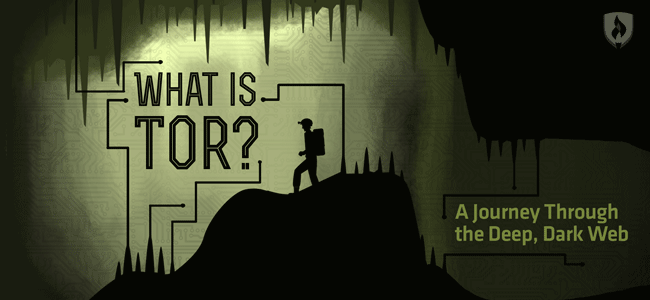
To the average internet user, the Dark Web probably seems like the black forest must’ve seemed to Hansel and Gretel. There’s something in the name “Dark Web” that ignites the imagination. The mysterious Dark Web gets news mentions suggesting that this “hidden internet” is crawling with criminals and terror groups.
But as these experts will tell you, the illegal and immoral side of anonymity on the web is only one part of the story.
If the Dark Web piques your interest, you may have already run into terms like I2P, Freenet and Tor. These tools for the technology-fluent are employed all over the world (and in the hands of more than just the criminal classes.)
So, what is Tor? And what does it have to do with the Dark Web? Read on for a look into the forest.
Deep Web vs. Dark Web
“To understand Dark Web, we have to understand Deep Web and the Surface Web,” says Nick Espinosa, CIO and chief security fanatic at BSSi2.
"The Dark Web is that part of the Deep Web that really doesn't want to be found."
Espinosa explains the Surface Web is any website or page that can be indexed and easily searched by search engines like Google. The Deep Web is anything on the internet that cannot be indexed and searched directly by a public search engine. Examples of these are government or educational websites which have their own internal search capabilities to look for their specific data.
“The Dark Web is that part of Deep Web that really doesn’t want to be found,” Espinosa says. Drugs, weapons and human trafficking are all traded on the Dark Web. He adds that this “cyber-warfare arms bazar” allows users to purchase the latest malware, hire hackers to break into virtually anything and even deal with the Russian Mob.
“It's technically anything that requires more than just a web browser to access,” says Sean Vogt, director of operations at Greenview Data. “It's important to note that the Dark Web is not a single entity, but many ‘Dark Webs’ that are each generally independent of one another.” Tor is simply the largest of these entities, according to Vogt.
So what is Tor, anyway?
“Tor is a web browser that allows you to browse the Dark Web,” Espinosa says. Dark websites don’t use .com domain extensions, but something else (like a .onion domain extension.) Tor knows how to route to these, while browsers like Internet Explorer or Firefox don’t. Tor is a translation layer for mainstream browsers to “talk” to the Dark Web, explains Mike Brady, systems administrator at Greenview Data.
He compares it to playing the game “telephone” when you were younger. The more data moves around, the harder it is to decipher the original information.
Brady explains that using Tor, the first computer you connect to (the entrance node) can see who you are, but not what you're accessing. The last server (the exit node) can see what you're accessing but not who you are. This layering effect earned the nickname “onion router.”
“So if you’re sitting in Chicago, your internet traffic may be connecting to the Deep/Dark Web through Luxembourg or Thailand or anywhere else in the world,” Espinosa explains. “The point is to mask your actual location so authorities and other entities cannot determine your original location.”
Yet, despite the encryption Tor employs, it isn’t without vulnerability. Espinosa says serious hackers will use a more secure tool. Some will layer their Tor connection with something like a public VPN to further distance their physical location from the internet connection.
Why would someone use Tor?
All this complicated masking isn’t for naught. According to Brady, Tor began as a US Navy research project to offer an anonymous online space for truly free speech. People in countries with restricted free speech rights or internet access could engage online using Tor with less fear of being tracked by their governments.
“Many political dissidents and activists will use the Dark Web to hide from their oppressive government so they can plan and coordinate,” Espinosa says.
If numbers are any indication, this security is a hot commodity. Facebook’s hidden service in Tor recently reached one million hits in a single month period. According to Brady, services offered through Tor have extra security for Tor users by deploying a “guard node” on top of the usual onion routers.
The anonymity of Tor and the Dark Web certainly appeals to those dealing drugs, weapons, malicious code and other illegal exchanges. But the vast majority of Tor users are there simply to protect their privacy and communications, according to Brady.
Can the Dark Web be useful to the average person?
If you want to swim in the deep end, first make sure you really know how to swim. Brady warns the average internet user against dabbling with Tor unless they’ve taken time to understand not only how it works, but also how other people might use it.
"Think of it as the local, seedy bar where all the criminals hang out"
“Experience with the Dark Web isn’t necessarily a matter of education, but a matter of interest,” says Brady, pointing out that even a technology major shouldn’t jump into Tor without preparation. Why not? Because the most technologically capable “big fish” also swim in the deep end, and they know how to exploit unwary user defenses to steal information, inject malware or hijack accounts.
Tor is not without its risks. So if you aren’t after illicit goods and you live in a country with free speech, is there any reason to use Tor?
“People have adjusted their online habits after the FBI Snowden leaks,” Brady says, which suggests the public is not comfortable sharing their information. The Deep Web can be utilized to securely log into sensitive data for bank or credit card accounts, Espinosa adds. The Dark Web, on the other hand, isn’t really useful to the average, law-abiding citizen. “Think of it as the local, seedy bar where all the criminals hang out,” he says.
But Espinosa adds that a societal change could definitely send more people into Deep and Dark Web territories. Attention to the value of user data and how it is being used or monitored has already diverted traffic in the anonymity direction. A few significant breaches of faith against the general public could change the way we use the internet.
Should technology majors know about the Deep and Dark Web?
There is a more career-oriented reason to access the Dark Web. Brady and Vogt both emphasize that familiarity with Tor looks appealing on a potential hire’s resume.
"Knowing that someone has heard of Tor or the Dark Web is a promising sign."
“Knowing that someone has heard of Tor or the Dark Web is a promising sign,” Brady says. “We don’t use Tor in our line of work, but a lot of the necessary skills cross over.” This also suggests you have an interest in encryption and are curious, which goes a long way in this field, according to Brady.
If you’re interested in information security careers, learning about the Dark Web is even more valuable. Espinosa investigates Dark Web cyber-attacks on a regular basis to better defend his clients’ systems.
“For white-hat hackers such as myself, it’s a good way to keep up with the latest threats and tactics black-hat hackers are using,” Espinosa says.
You’ve been warned
What is Tor? For some, it’s just not worth the training and the risk. But for others, Tor and other portals to the Dark Web incite the right kind of curiosity. There are cyberwars happening around the clock. If you’d like to join the frontlines of defense, there is plenty of room for you.
The field of information security is growing much faster than average, according to the Bureau of Labor Statistics. As more and more criminal activity turns to online channels, we need defense experts more than ever.
Want to do something about it? Learn How to Become an Information Security Analyst and Fill the Gap in the Tech Field.
RELATED ARTICLES:




